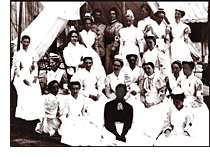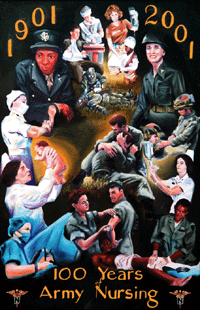Never far behind American troops, ANC members have made great contributions during times of war and peace.
 In 1901, the permanent Nurse Corps was created with 202 charter members and 37 nurses on reserve status. By July 1918, when the Corps was re-designated as the Army Nurse corps (ANC), as it is known today, the ranks had swelled considerably, with thousands of nurses serving in World War I. In fact, by Armistice Day, Nov. 11, 1918 the ANC numbered more than 21,000, with almost half of those nurses serving overseas.
In 1901, the permanent Nurse Corps was created with 202 charter members and 37 nurses on reserve status. By July 1918, when the Corps was re-designated as the Army Nurse corps (ANC), as it is known today, the ranks had swelled considerably, with thousands of nurses serving in World War I. In fact, by Armistice Day, Nov. 11, 1918 the ANC numbered more than 21,000, with almost half of those nurses serving overseas.
The number of ANC nurses, which had decreased significantly after WWI, began to grow again in May 1941 when a state of national emergency was declared due to the threat of global war. As a result, the ANC began activating reserve nurses. When the United States entered WWII, shortly after the bombing of Pearl Harbor, fewer than 7,000 nurses were on active duty. Six months later that number had jumped to 12,000 active-duty nurses.
During WWII, ANC nurses were never far from the action. Often they served very close to the front lines, under fire in field hospitals and evacuation hospitals, on hospital trains and hospital ships, and on medical transport planes. ANC nurses worked with few supplies in difficult conditions after Pearl Harbor was bombed; served in the Philippines and were evacuated just one day before the American forces surrendered at Bataan; spent years as prisoners of war at Santo Tomas Internment Camp in Manila; waded ashore as part of D-Day Operation TORCH; followed troops through France; and accompanied Allied troops into Germany just to name a few of their WWII accomplishments.
In all, more than 59,000 American nurses served in the ANC during World War II. Their skill is credited with contributing to the low post-injury mortality rate among American soldiers.
When the Air Force Nurse corps was established in July 1949, close to 1,200 ANC nurses transferred to the new Corps.
 As they had during past conflicts, ANC nurses played a vital role in the Korean War. Just days before President Truman ordered troops to Korea, Viola B. McConnell, the sole Army nurse in Korea at the time, escorted about 700 American evacuees to Japan. Beginning in July 1950, additional Army nurses arrived to serve in Korea. Approximately 540 Army Nurse Corps officers served in 25 medical treatment facilities, including mobile Army surgical hospitals (MASH); evacuation, field and station hospitals; and hospital trains.
As they had during past conflicts, ANC nurses played a vital role in the Korean War. Just days before President Truman ordered troops to Korea, Viola B. McConnell, the sole Army nurse in Korea at the time, escorted about 700 American evacuees to Japan. Beginning in July 1950, additional Army nurses arrived to serve in Korea. Approximately 540 Army Nurse Corps officers served in 25 medical treatment facilities, including mobile Army surgical hospitals (MASH); evacuation, field and station hospitals; and hospital trains.
In 1955, a new law authorized commissions for male nurses in the Army Reserve to be assigned to the ANC and the first three male nurses began airborne training in the next year.
In 1962, the first ANC nurses arrived in Vietnam and Thailand. By 1966, almost 300 male and female nurses from the Army, Navy and Air Force were serving in Vietnam. Within the 11-year period, the number of nurses in Vietnam at one time reached 900.
During the years after the Vietnam War, ANC nurses continued to serve around the world. ANC nurses were called to duty when the building of the Berlin Wall caused a war scare in 1961, during the Cuban Missile Crisis in 1963, during the Dominican Republic Crisis in 1965, and during a Lebanon Crisis in 1958. They also served in humanitarian efforts, including in Iran after a 1962 earthquake and in Chile in 1960, to help victims of an earthquake and tidal wave.
Just five months after the start of Operation Desert Shield/Desert Storm, numerous medical facilities were in operation. The largest Army Medical Department deployment since the Vietnam War, this operation included more than 2,000 nurses.
ANC personnel also provided support for Operation Provide Promise in Croatia, Operation Restore Hope in Somalia, Operations Allied Force and Joint Guardian in Albania and Kosovo and more.
Throughout the ANC's history, ANC nurses have served around the globe in times of both war and peace. For the past 100 years, they have offered support to troops and humanitarian aid and disaster relief services to citizens of many nations around the world Ñ and will continue to do so the future.
Winter 2001-2002 Table of Contents
[if:(cookie:'ID')=='']





